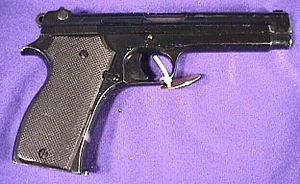- Modèle 1935 pistol
-
Modèle 1935 pistol 
Modèle 1935A pistolType Semi-automatic pistol Place of origin  France
FranceService history In service 1937–1960s Used by See Users Wars World War II
First Indochina War
Algerian WarProduction history Designer Charles Petter Designed 1935 Manufacturer Société Alsacienne de Constructions Mécaniques
Manufacture d'armes de Saint-Étienne
Manufacture Française d’Armes et Cycles de Saint Étienne / ManuFrance
Societe d'Applications Generales d'Electricite et de la Mecanique
Manufacture d'armes de ChâtelleraultProduced 1937–1956 Variants 1935A
1935S
1935S M1Specifications Weight 730 g (A), 790 g (S) (unloaded) Length 188 mm Cartridge 7.65mm Longue Action Blowback Muzzle velocity 304 m/s (997.1 ft/s) Feed system 8 round, single stack magazine Sights iron sights Two similar but distinct French military pistols carry the designation "model 1935", the model 1935A and the model 1935S. Both were designed to compete in the 1935-37 French military trials conducted by the Commission d’Experiences Techniques de Versailles to select a new sidearm. While similar in concept and design due to the specific requirements of the trials committee, they share no parts in common.
The Pistolet automatique modèle 1935A (Automatic Pistol Model 1935A) or Modèle (Mle.) 1935 A was a semi-automatic pistol chambered for the 7.65mm Longue cartridge. It was developed by the Swiss Charles Petter (a former captain of French Foreign Legion), engineer of the French company Société Alsacienne de Constructions Mécaniques de Cholet (SACM) and used by the French Army in several wars. It won the 1935-37 competition to produce the new French military sidearm. Initial production began in 1937, and the pistol began delivery to the French Army in late 1939, with a total of about 10,700 pistols built before German forces occupied the SACM factory in the summer of 1940. The Germans continued production of the 1935A, now designated the "Pistole 625 (f)", with about 23,850 pistols made for the German forces. Following the end of the German occupation of France in 1944, SACM resumed production of the 1935A for the French military, making a further 50,400 pistols. In total, about 84,950 1935A pistols were produced between October 1937 and February 1950.
In 1937, Switzerland’s Schweizerische Industrie Gesellschaft (see also its related company SIG Sauer) purchased a license from SACM for the 1935A, which became the basis for the development of the SIG P210.
The Pistolet automatique modèle 1935S (Automatic Pistol Model 1935S) or Modèle (Mle.) 1935 S was a semi-automatic pistol chambered for the 7.65mm Longue cartridge. It was designed by Manufacture Nationale d'Armes de Saint-Étienne (MAS), a French government arsenal. It was a competitor in the 1935-37 French military trials to select a new sidearm, losing to the SACM 1935A. However, as France prepared for the looming war in Europe it became apparent that SACM production was inadequate to meet the military's needs. In 1938 additional contracts were given to MAS to produce the 1935S, and all production of the commercial MAB model D and MAPF "Unique" model 17 pistols was diverted to the military. MAS began initial delivery of the 1935S to the French military in early 1939, but production ceased after only about 1404 pistols were built when German forces occupied Saint-Étienne in the summer of 1940. MAS factory workers were able to hide key 1935S tooling and machinery before the Germans occupied the factory; as a result, unlike the 1935A, MAB D and Unique 17, the 1935S was not produced during the German occupation of France. Production resumed in 1944 after the end of the occupation. Since MAS was also a primary producer of French military rifles and light machine guns needed for the French colonial war in Indochina, production of the 1935S was shifted to other French arms producers in late 1944, after MAS had built of total of about 6,686 pistols. The other makers of the 1935S were M-F (Manufacture Française d’Armes et Cycles de Saint Étienne, aka ManuFrance) which built about 10,000 pistols in 1944-45; SAGEM (Societe d'Applications Generales d'Electricite et de la Mecanique), which built about 10,000 pistols in 1945-1953, and MAC (Manufacture Nationale d’Armes de Chatellerault), which built about 56,087 pistols in 1946-1956. MAC revised the 1935S safety to function as did the 1935A safety; this change was included in all MAC and SAGEM 1935S production starting in 1946, with the pistols marked 1935 S M1 starting in March 1947. In total, about 82,773 1935S pistols were produced between 1937 and 1956.
The 1935S directly inspired the design of the French service pistol that replaced the 1935A and 1935S, the MAC Mle 1950 in 9mm Parabellum.
Users
References
- Medlin, Eugene and Colin Doane. The French 1935 Pistols: A Concise History. Latham, NY: Excaliber Publications, 1995
- Medlin, Eugene and Jean Huon. French Service Handguns 1858-2004. St Louis, MO: Tommy Gun Publications, 2004.
- Buffaloe, Ed. The French 1935 Service Pistols. (http://unblinkingeye.com/Guns/F1935S/f1935s.html)
External links
- World Guns page (English)
- littlegun.be page about SACM 1935 (English)
- littlegun.be page about 1935S (English)
- ARMES HISTORIQUES Du XX ème Sieclepage about SACM 1935A (French)
- ARMES HISTORIQUES Du XX ème Siecle page about MAS 1935S (French)
- Armes Francaises page about SCAM 1935A (French)
- Armes Francaises page about MAS 1935S & MAC 1935SM1 (French)
French infantry weapons of World War IISide arms Rifles and carbines Submachine guns Machine guns and other larger weapons Mortars Brandt Mle 1935 · Brandt mle 27/31Grenades F1 grenadeCartridges used by France during WWII Categories:- French semi-automatic pistols
- World War II French infantry weapons
- .32 Longue firearms
Wikimedia Foundation. 2010.

